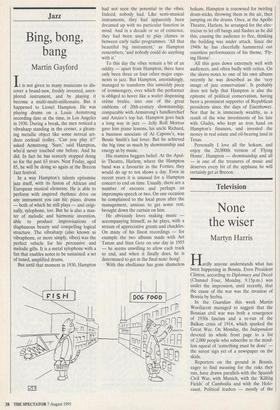Television
None the wiser
Martyn Harris
Hardly anyone understands what has been happening in Bosnia. Even President Clinton, according to Diplomacy and Deceit (Channel Four, Monday, 9.15p.m.) was under the impression, until recently, that the cause of the war was the invasion of Bosnia by Serbia.
In the Guardian this week Martin Woollacott managed to suggest that the Bosnian civil war was both a resurgence of 1930s fascism and a re-run of the Balkan crisis of 1914, which sparked the Great War. On Monday, the Independent devoted its whole front page to a list of 2,000 people who subscribe to the mind- less squeal of 'something must be done' the surest sign yet of a newspaper on the skids.
Reporters on the ground in Bosnia, eager to find meaning for the risks they run, have drawn parallels with the Spanish Civil War, with Munich, with the 'Killing Fields' of Cambodia and with the Holo- caust. Political leaders — mostly of the authoritarian right — have taken pleasure in observing how the Balkans conflict destroys the Bush fantasy of 'a new world order' — as if even George Bush ever took that seriously. It all goes to prove that peo- ple are as wicked as they ever were, and consequently as much in need of right-wing authoritarian leadership. It is as if any con- flict in which 200,000 have died and two million lost their homes must contain some historical metaphor, some wider political resonance.
Diplomacy and Deceit, presented by diplomatic editor Nick Gowing was the opening of a three night Channel Four campaign to 'explain' the war. It made an unpromising start, concentrating as it did on the culpability of the West in failing to solve the conflict. This argument runs: a) Yugoslavia is in our back yard; b) We wel- comed the collapse of Communism and its sphere of influence; c) We recognised Croatia and Slovenia as independent states; d) We have a duty to sort out the resultant mess; e) Armed intervention is the only realistic way to do it.
As with any silly argument it contains grains of sense. Germany probably was mistaken, precipitately to recognise the new republics in 1991, though as Douglas Hurd argued on this programme, it would have been inevitable for the rest of the European countries within a matter of weeks. Armed intervention now, on a Gulf War scale, certainly would stop the killing of innocent civilians, but what happens after that? Aneurin Bevan once said that `fascism is not a new order of society — it is the future refusing to be born'. Croatia and Serbia are certainly fascist in their sup- pression of political pluralism and their devotion to ethnic purity, but they are not likely, as Woollacott imagines, to 'become models for other states in eastern and south-eastern Europe'.
Democracy is not, as many people rea- sonably feared in the 1930s, a flickering flame of idealism always on the brink of extinction, and neither is it simply a high- minded dispersal of power to the individual (though it is partly that). Far more impor- tantly it is the device by which the centrali- sation and expansion of state power is legitimised and stabilised. With the col- lapse of totalitarian experiments in the last half century it is the only device we have for maintaining large, powerful, modern states in a reasonable state of equilibrium. There is no alternative, and to look to the Balkan conflict as if it threatened one is absurd.
The Bosnian war is a vicious little nation- alistic sort-out: an old-fashioned turf-war which should have been fought with bows and arrows, or possibly muskets, but because of centuries of domination by the empires of East and West is finally being fought with Kalashnikovs. It is not the future, but the future refusing to be born, and more intervention will only delay the birth still further.



















































 Previous page
Previous page